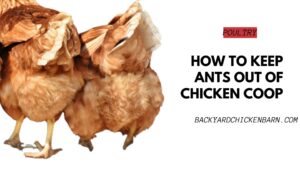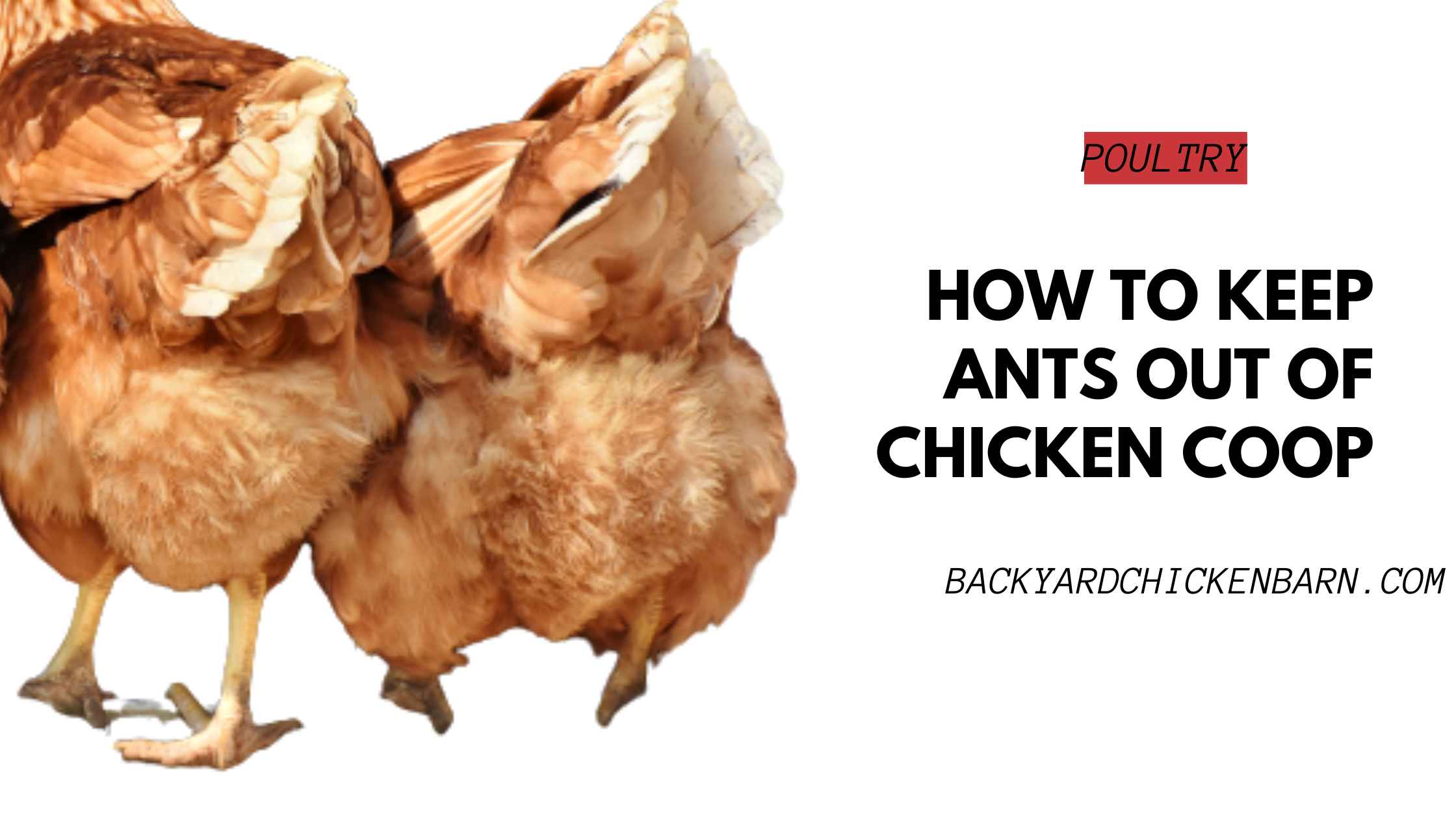How to Keep Ants Out of Chicken Coop
For many of us who adore our backyard chickens, it’s not just the larger predators that can pose a threat to our feathered friends.
Sometimes, it’s the smallest pests that prove to be the trickiest adversaries.
Such was my experience when I faced an ant invasion in my chicken coop.
To address the primary concern directly: keep ants out of your chicken coop by maintaining cleanliness, ensuring no food remnants are left out, using natural deterrents like diatomaceous earth or citrus peels, and setting up barriers or moats around food and water sources.
When I first noticed ants marching into the coop, I assumed they were harmless explorers. But as their numbers grew, I realized the challenge at hand.
Here’s the game plan I adopted to reclaim my coop:
Prioritize Cleanliness
Ants are attracted to food. I made it a point to remove any uneaten food from the coop daily. Regularly cleaning the coop, especially around the feeding areas, can deter ants.
Diatomaceous Earth
This natural product became my ally. Sprinkling food-grade diatomaceous earth around the coop perimeter and feeding areas created an inhospitable zone for ants, deterring their advance without harming my chickens.
Use Natural Deterrents
Beyond diatomaceous earth, I discovered that certain natural elements like citrus peels, cinnamon, and peppermint oil can repel ants.
By placing or sprinkling these around the coop’s entrance and high-traffic ant areas, I noticed a decline in their activity.
Elevate and Protect Food and Water
Raising the food and water containers off the ground made it harder for ants to access. For added protection, I set up a small moat around the stands, which served as a barrier ants couldn’t cross.
Check for Ant Nests
By doing a thorough inspection, I found and removed a few ant nests close to my coop. Relocating or eliminating these nests significantly reduced the ant incursions.
Seal Cracks and Gaps
Any tiny entry points can be gateways for ants. I ensured to seal all visible cracks, gaps, or crevices in the coop’s structure, especially near the base.
Avoid Chemical Pesticides
Though tempted, I refrained from using chemical ant killers. These could potentially harm my chickens or contaminate their eggs.
Consult the Neighbors
Reaching out to my local community, I found other chicken keepers who had battled and bested the ant menace. Their advice and tried-and-tested remedies proved invaluable.
Monitor Regularly:
Post my ant-eradication steps, I kept a close watch on the coop. Regular checks ensured early detection if the ants tried to mount a comeback, allowing me to act swiftly.
Today, while I respect the resilience of these tiny creatures, I’ve successfully managed to make my coop an ant-free zone.
By adopting these strategies, I not only protected my flock but also ensured a cleaner and more hygienic environment for them.
The key, I’ve found, lies in persistence, natural remedies, and a bit of innovative thinking.
ALSO SEE: How to Hang Feeder in Chicken Coop

FAQs on Keeping Ants Out of the Chicken Coop
1. Why are ants attracted to chicken coops?
Ants are primarily attracted to food remnants in the coop.
2. Is diatomaceous earth safe for chickens?
Yes, but ensure you use food-grade diatomaceous earth.
3. How often should I clean the coop to deter ants?
Regularly, especially around the feeding areas, and remove uneaten food daily.
4. Can I use any citrus peel to repel ants?
Yes, most citrus peels like lemon, orange, or grapefruit can act as deterrents.
5. Will cinnamon harm my chickens?
No, cinnamon is a natural deterrent for ants and is safe for chickens.
6. How do I set up a moat around the food and water containers?
Place the containers on raised stands and fill a tray or shallow dish beneath them with water.
7. What should I do if I find an ant nest near my coop?
You should either relocate or eliminate the nest to reduce ant activity.
8. How do I seal cracks and gaps effectively in the coop?
Use caulking or weatherstripping materials to seal any visible cracks or gaps.
9. Are chemical ant killers dangerous for chickens?
Yes, they can potentially harm your chickens or contaminate their eggs.
10. How can I monitor my coop for ants?
Conduct regular checks, especially near the entrance and feeding areas.
11. Why is food-grade diatomaceous earth preferred?
It’s safe for chickens and won’t pose health risks.
12. Can I use vinegar as an ant repellent?
Yes, vinegar can deter ants, but ensure it doesn’t come in contact with the chickens’ food or water.
13. How effective is peppermint oil against ants?
Peppermint oil is a natural deterrent that can repel ants when sprinkled around high-traffic ant areas.
14. Will elevating food and water containers deter other pests as well?
Yes, raising containers can deter many ground-based pests, not just ants.
15. How do I know if the ants in the coop are harmful?
Most ants are harmless, but their numbers can pose hygiene concerns. Some species, like fire ants, can be aggressive and harmful.
16. How far from the coop should ant nests be relocated?
At least several yards away, ensuring they don’t find their way back.
17. Can I sprinkle diatomaceous earth inside the coop?
Yes, but ensure it doesn’t mix with the chickens’ food or water.
18. How often should I replace the citrus peels or cinnamon?
Replace them once they dry out or lose their scent, typically every few days.
19. Will sealing the coop also prevent other pests?
Yes, sealing cracks and gaps can deter various pests, including rodents.
20. Why is it crucial to keep ants out of the chicken coop?
Apart from hygiene concerns, ants can stress chickens and, in large numbers, can consume their food.
21. Are there any other natural deterrents I can use against ants?
Yes, other options include coffee grounds and crushed chalk.
22. What kind of food attracts ants the most?
Sweet foods, grains, and protein sources can attract ants.
23. Do ants pose a threat to chicken eggs?
While ants typically don’t harm eggs, they can be attracted to broken ones.
24. How do water moats deter ants?
Ants can’t cross water barriers, preventing them from reaching the food.
25. Can I mix diatomaceous earth with the chickens’ sand bath?
Yes, it can help deter both ants and other parasites.
26. How do neighbors help in dealing with the ant problem?
Sharing experiences and remedies can provide insights and proven solutions.
27. How quickly can I expect to see results after implementing these solutions?
Most solutions show results within a few days, but consistent efforts ensure long-term success.
28. Are ants a common problem in chicken coops?
Yes, many chicken keepers face ant issues due to food attractions.
29. Can ants harm my chickens?
Most ants are harmless, but some species can bite or stress the chickens.
30. Is it essential to address the ant problem immediately?
Yes, addressing early prevents the situation from worsening and maintains coop hygiene.
31. Do I need to empty the coop before applying these solutions?
Not necessarily, but ensure the chickens aren’t exposed to large amounts of deterrents.
32. How does cleanliness deter ants?
Cleanliness ensures no food remnants are left, which are primary attractants for ants.
33. Should I be concerned about ant trails leading to the coop?
Yes, trails indicate an active path to food sources and should be addressed.
34. Can ants impact the health of my chickens?
While not directly, ants can stress chickens and compromise the coop’s hygiene.
35. Do commercial ant repellents work better than natural ones?
Commercial repellents may work faster, but they can pose risks to chicken health.
36. Will these ant deterrent methods work for other coop pests?
Some methods, like cleanliness and sealing gaps, are effective for various pests.
37. How can I ensure that ants don’t return?
Regular monitoring and maintaining cleanliness will help keep ants at bay.
38. Can ants contaminate chicken food?
Yes, ants can bring in dirt and other small pests, potentially contaminating the food.
39. Are there any specific coop designs that deter ants?
Designs that incorporate elevated food/water sources and fewer gaps can be more ant-resistant.
40. Do I need to consult a pest professional for an ant infestation?
For minor issues, DIY solutions work. But for severe infestations, professional help might be needed.


